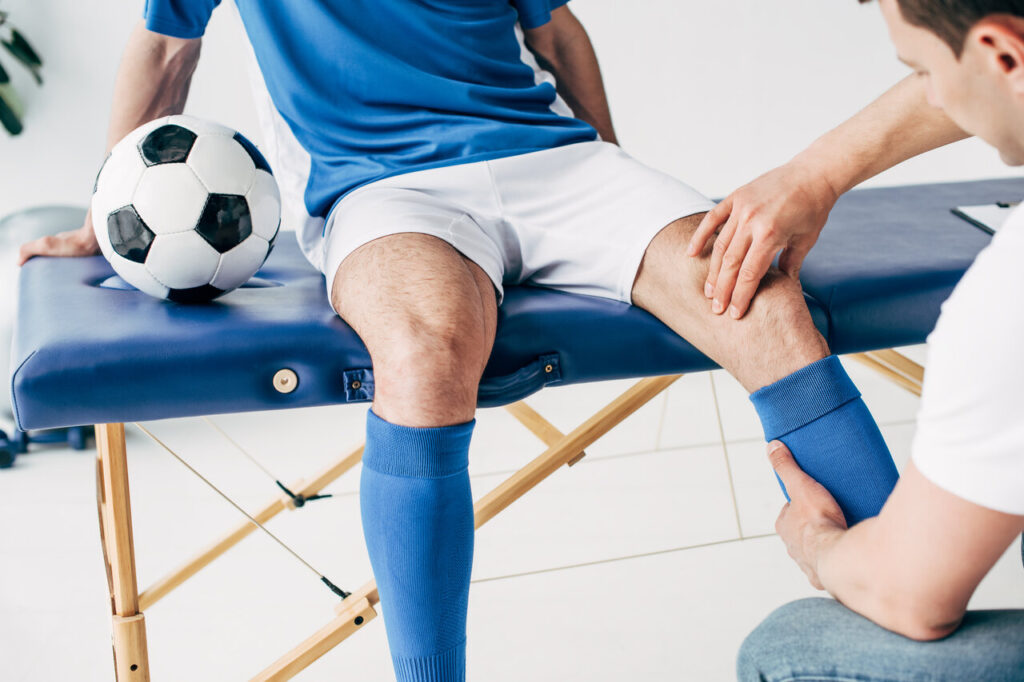
partial view of Physiotherapist massaging leg of football player in hospital
Sports physicals are a fundamental step for athletes of all ages, making sure they are healthy and ready to participate safely in physical activities. These exams go beyond a routine check-up by focusing on the specific demands of sports, helping to identify potential risks and prevent injuries. Understanding the key components of a comprehensive exam can help athletes and parents know what to expect and why it matters. Here are the key components of annual sports exams:
Why Are Sports Physicals Key?
The primary goal of annual sports exams is to identify medical conditions that could increase an athlete’s risk of injury. It also helps identify risk factors for sudden health problems that may occur during physical activity. These exams help establish baseline health measurements that can be useful if injuries occur later.
Healthcare providers use sports physicals to detect conditions that may not cause symptoms during everyday activities but become dangerous during intense exercise. The exam also provides an opportunity to discuss nutrition, hydration, and injury prevention strategies with young athletes. Athletic organizations rely on these evaluations to make sure their participants can safely engage in sports activities.
What Happens During History Review?
The medical history portion forms the foundation of every comprehensive sports physical. Healthcare providers will ask detailed questions about the athlete’s past health experiences, family medical history, and current lifestyle habits. Athletes should come prepared to discuss previous injuries, surgeries, or ongoing health conditions. The provider will also inquire about any medications, supplements, and symptoms the athlete has experienced during exercise. This conversation helps identify risk factors that might not be apparent during the physical examination alone.
What Happens During Physical Examination?
The physical examination portion of sports physicals includes several key assessments designed to evaluate different body systems. :
- Health Signs Assessment: Providers measure blood pressure, heart rate, height, and weight to establish baseline values.
- Cardiovascular Evaluation: Healthcare professionals listen to the heart for irregular rhythms, murmurs, or other abnormalities that may indicate underlying heart conditions. They also assess pulses in various locations and look for signs of heart disease.
- Musculoskeletal Examination: This evaluation focuses on assessing the strength, flexibility, stability, and range of motion of joints, muscles, and bones.
- Vision and Hearing Tests: These assessments make sure athletes do not have sensory impairments that could impact performance or safety during physical activities.
- Neurological Assessment: Tests of reflexes and coordination are performed to detect neurological issues. This is key in sports that require complex movements or present a heightened risk of head injuries.
These comprehensive physical examination components are key for identifying any potential health issues and aiding an athlete’s safety during physical activity.
What Is Included in Laboratory Testing?
Laboratory testing may be included in comprehensive sports physicals depending on the athlete’s age, health history, and sport requirements. Blood work can reveal conditions like anemia, diabetes, or kidney problems that may not show obvious symptoms. Urinalysis provides information about kidney function and can detect underlying medical conditions. Some providers may also order more tests based on specific risk factors identified during the history and physical examination. Athletes with known medical conditions may require specialized testing to make sure their conditions are well-controlled before participating in sports.
Schedule Your Sports Physicals Today
Sports physicals are a fundamental component of safe athletic participation for students of all ages. These comprehensive evaluations help identify potential health risks while promoting overall wellness in young athletes. Athletes and parents should schedule annual sports exams before the start of each sports season to allow time for necessary follow-up care or treatment. Contact a qualified healthcare provider near you today to schedule a sports physical for your student-athlete.




